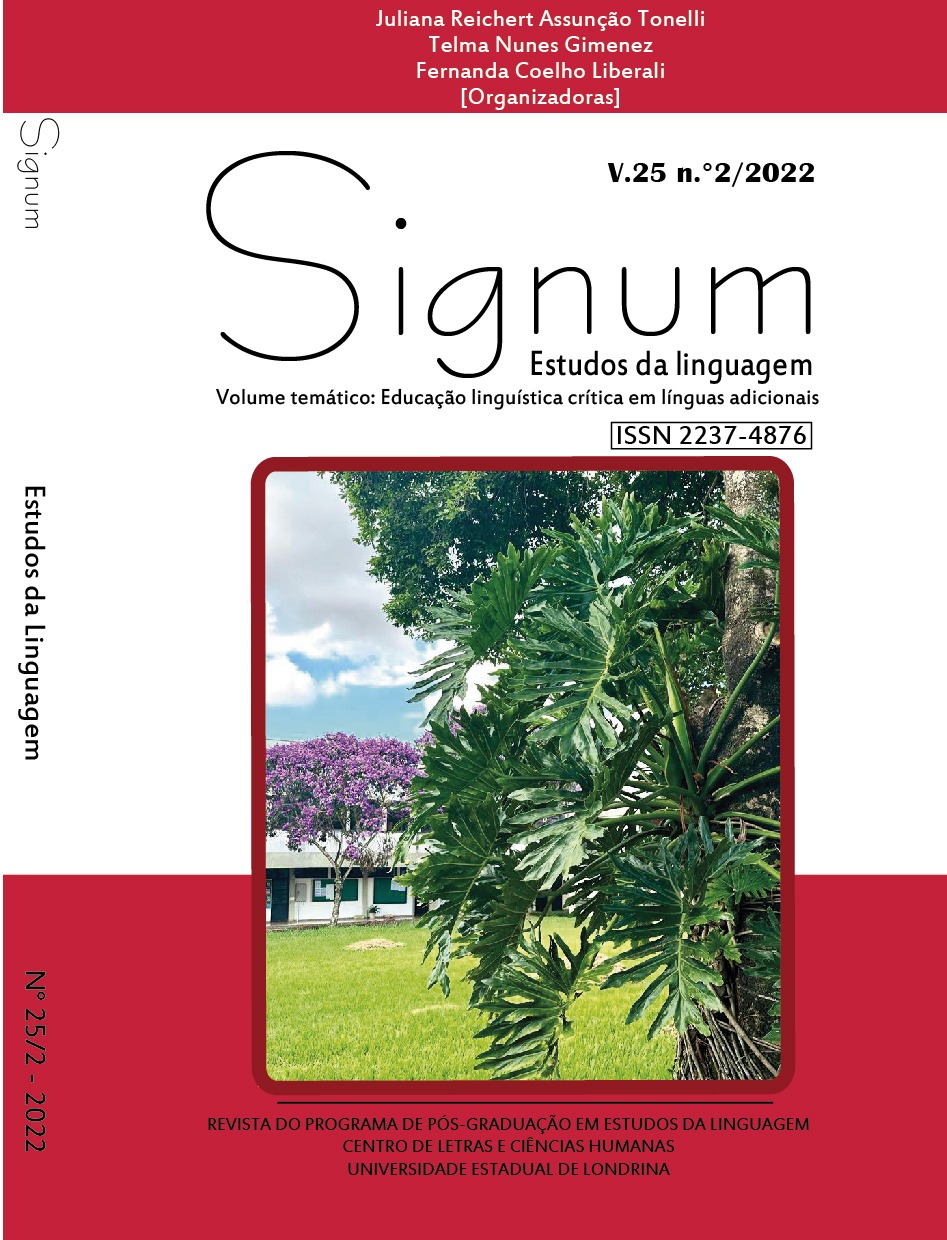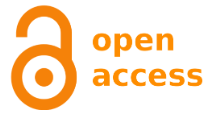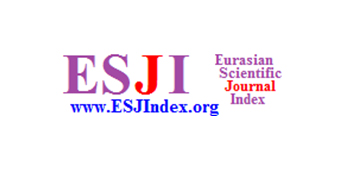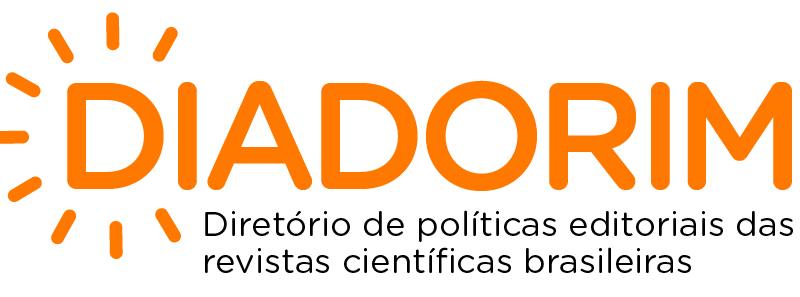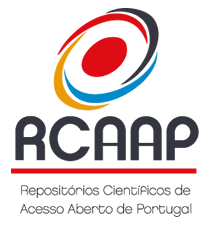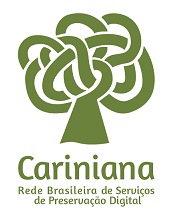Studying the Concept of Love in Language Education:
a review of studies within the critical approach
DOI:
https://doi.org/10.5433/2237-4876.2022v25n2p24Palabras clave:
Love, Critical Approach, Language EducationResumen
Love is a universal emotion and phenomenon. Despite its importance, this concept has not
been the focus of studies in language education, with a few exceptions. This reticence and
uneasiness in researching love in academia and in education is considered to be related to
misconceptions about love that equate it only to intimate relationships and family matters
(PATIENCE, 2008), as well as exclusively to romantic love (VINCENT, 2010). In this paper,
I review some international studies that have focused on the concept of love in education
from a critical perspective. In order to do that, I first review the crisis we are living today,
which makes it ever more important to talk about love. Next, I discuss six studies which
investigated the concept of love within the critical approach (in the North American
context). I conclude suggesting reflections and implications for practice and summarizing
the main elements of a critical revolutionary love approach to language teacher education
and language learning and teaching.
Descargas
Citas
BARCELOS, Ana Maria F. Pedagogy of love: a metasynthesis of studies in education and implications for
language teaching. 2019. 29 f - Relatório (Pós-doutorado) - Universidade Federal de Viçosa, Departamento
de Letras.
BARCELOS, Ana Maria F. Revolutionary love and peace in the construction of an English teacher's
professional identity. In: OXFORD, Rebecca; OLIVERO, María M.; HARRISON, Melinda. Peacebuilding
in language education: innovations in theory and practice. Bristol: Multilingual Matters, 2021. p. 96-109.
BARCELOS, Ana Maria F.; ARAGÃO, Rodrigo C. Emotions in language teaching: a review of studies
on teacher emotions in Brazil. Chinese Journal of Applied Linguistics, Beijing, China, v. 41, n. 4, p. 506-531,
BARCELOS, Ana Maria F.; COELHO, Hilda Simone H. Language learning and teaching: What's love got to
do with it. Positive Psychology in SLA, Bristol, v. 97, p. 130-144, 2016.
BUSCAGLIA, Leo. Vivendo, amando e aprendendo: para compreender melhor a vida e o amor. Rio de Janeiro:
Viva Livros, 2016.
BYRON, Amanda S. Storytelling as loving praxis in critical peace education: a grounded theory study of
postsecondary social justice educators. 2011. 245 p. These (Doctor of Education in Educational Leadership:
Curriculum and Instruction) - Portland State University, Portland, 2011.
CHABOT, Sean. Love and revolution. Critical Sociology, Eugene, US, v. 34, n. 6, p. 803-828, nov. 2008.
COLONNA, Sara; NIX-STEVENSON, Dara. Radical love: love all, serve all. International Journal of Critical
Pedagogy, Greensboro, NC, v. 6, n. 1, p. 5-25, 2015.
DOUGLAS, Ty-Ron; NGANGA, Christine. What's radical love got to do with it: navigating identity,
pedagogy, and positionality in pre-service education. The International Journal of Critical Pedagogy, Greensboro,
v. 6, n. 1, p. 58-82, 2015.
FREIRE, Paulo. Pedagogia da autonomia. São Paulo: Paz e Terra, 1996.
FREIRE, Paulo. Pedagogy of the city. New York: The Continuum International Publishing Group, 1993.
FREIRE, Paulo. Teachers as cultural workers: letters to those who dare teach. Boulder: Westview Press, 2005.
FREIRE, Paulo. Pedagogia do oprimido. 23. ed. Rio de Janeiro, Paz e Terra, 1994.
GIDLEY, Jeniffer. Pedagogical love: an evolutionary love. In: GIDLEY, Jeniffer. Postformal education:
a philosophy for complex futures. New York: Springer, 2016. p. 189-206.
GOLDSTEIN, Lisa. Teaching with love: a feminist approach to early childhood education. New York: Peter
Lang, 1997.
HATTAM, Robert; ZEMBYLAS, Michalinos. What's anger got to do with it? Towards a post-indignation
pedagogy for communities in conflict. Social Identities, Abingdon, v. 16, n. 1, p. 23-40, Jan. 2010.
HOOKS, Bell. All about love: new visions. New York: William Morrow, 2000.
HOOKS, Bell. Outlaw culture: resisting representations. New York: Routldge, 2006.
HOOKS, Bell. Teaching community: a pedagogy of hope. New York: Routledge, 2003.
HOOKS, Bell. Teaching to transgress: education as the practice of freedom. London: Routledge, 1994.
LANAS, Maija; ZEMBYLAS, Michalinos. Revolutionary love at work in an arctic school with conflicts.
Teaching Education, Columbia, SC, US, v. 26, n. 3, p. 272-287, Jan. 2015a.
LANAS, Maija; ZEMBYLAS, Michalinos. Towards a transformational political concept of love in critical
education. Studies in Philosophy of Education, New York, v. 34, p. 31-44, 2015b.
PATIENCE, Allan. The art of loving in the classroom: a defence of affective pedagogy. Australian
Journal of Teacher Education, Perth, AU, v. 33, n. 2, p. 55-67, May 2008. DOI: http://dx.doi.org/10.14221/
ajte.2008v33n2.4
SCHODER, Edward. Paulo Freire's pedagogy of love. 2010. 92 f. These (Doctor of Education) - University
of New Jersey, New Brunswick, 2010.
SMITH-CAMPBELL, Charmaine J. Freirean pedagogical love in P-12 education: a theory-to-practice investigation.
347 f. These (Doctor of Philosophy) - Mercer University, Atlanta, GA, 2018.
Signum: Estudos da Linguagem, Londrina, v. 25, i. 2, p. 24-35, Aug. 2022 34
VINCENT, Jennifer. Teaching (with) love: relational engagement in educational settings. 2016. 112 p. Thesis
(Master of Arts) - University of Victoria, Victoria, 2016.
ZEMBYLAS, Michalinos. Towards a transformational political concept of love in critical education. Studies
in Philosophy and Education, Dordrecht, NL, v. 34, n. 1, p. 31-44, 24 abr. 2014. Springer Science and Business
Media LLC.
Descargas
Publicado
Cómo citar
Número
Sección
Licencia
Derechos de autor 2023 Signum: Estudos da Linguagem

Esta obra está bajo una licencia internacional Creative Commons Atribución-NoComercial-SinDerivadas 4.0.
Signum: Estudos da linguagem, publica seus artigos licenciados sob a Licença Atribuição-NãoComercial-CompartilhaIgual 4.0 Internacional. Esta licença permite que terceiros façam download e compartilhem os trabalhos em qualquer meio ou formato, desde que atribuam o devido crédito de autoria, mas sem que possam alterá-los de nenhuma forma ou utilizá-los para fins comerciais. Se você remixar, transformar ou desenvolver o material, não poderá distribuir o material modificado.
